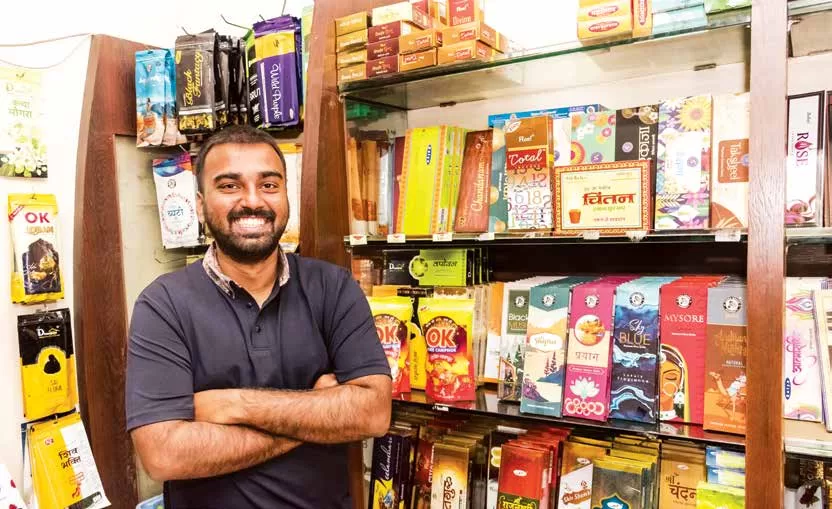
Door-to-Door Supply of Incense Products Also Done by Women in Sangli: Parth Ganesh Takate
0 comments


Parth Ganesh Takate, head of Parth Marketing and Arvind Dev Pooja Company—two prominent incense trading firms in Sangli, Maharashtra—believes theincense industry has a bright and evolving future. However, he stressed thatleading manufacturers must end the ongoing price war and focus on consistentproduct quality. Speaking to Sugandh India, Parth noted that Sangli had alreadyestablished itself as a major hub for incense trade even before the COVID-19pandemic. The city serves as a distribution centre for various brands, withcompanies like Forest and Welcome maintaining their Super Stockists here. As aresult, supply extends beyond Maharashtra into neighbouring states. He revealedthat the family business began in 1978, founded by his grandfather, who initiallymanufactured agarbattis and sold them door-to-door on a bicycle. After hisgrandfather’s passing, the family transitioned fully into trading. Today, the thirdgeneration continues to lead the business.
Speaking to Sugandh India, Parthrevealed that his incense journeybegan with his first brand, GaneshKrupa. They started trading businesswith Bengaluru-based Danka Agarbatti,followed by Ullas for some time, growing hisbrand portfolio. Today, he trades for 10 to 12incense brands, including Real Fragrance,Manohar, Good Luck, Jayant Agarbatti,Aagaz, Satya, and Zebra. Operating throughhis two firms—Parth Marketing and ArvindDev Pooja—he has built a strong supply chainspanning nearly 26 talukas within a100-kilometre radius of Sangli. Parth suppliesaround 2,000 retail counters, which includestationery shops, paan stalls, supermarkets,and general grocery stores. He also noted aunique aspect of the Sangli incense market—an extensive network of women engaged indoor-to-door sales of dhoopbatti products.
Parth identified Cycle Pure as the top-sellingincense brand in Sangli, with Balaji and ZedBlack following closely. Among other popularproducts are Forest, Orange Aroma, Zebra,Satya, and Real Fragrance. Parth highlighted agrowing preference for zipper packs with anMRP of ₹70–₹75, typically sold at ₹50. Lowerpricedproducts with ₹10 or ₹20 MRP seerelatively less demand. Larger zipper packsweighing 400–500 grams have recently gainedmomentum, with sales rising steadily. He statedthat agarbatti and dhoop enjoy strong year-rounddemand in the region. Agarbatticontributes around 70% of total sales, whiledhoop accounts for the rest. During Ganpatiand other festivals, sales volumes of bothsegments tend to balance each other. In thedhoop segment, he noted that 25% of salescome from wet dhoop, with Real Fragranceleading this category. Most wet dhoop productssell at ₹75 MRP and retail at ₹50. Balaji andForest [dry dhoop brands] sold at ₹10 are amongthe top sellers. He added that BIC products arealso present in the Sangli market.
Parth stated that TPRG Tapasya and Chintanare among the most popular names in Sangli’sSambrani Cup segment. TPRG Tapasya isconsidered premium products, typicallyretailing between ₹50–₹60. Speaking oncamphor sales, he noted that branded optionslike Mangalam and OK continue to performwell. However, 90% of the camphor market inSangli is dominated by unbranded localmanufacturers. OK, which once dominated themarket, now faces stiff competition from theseregional players. Parth also shed light onconsumer spending trends. On average, acustomer in Sangli spends up to ₹200 per monthon incense-related products. Premium buyers,however, spend between ₹700 and ₹1,000monthly. During festivals—individual purchasesoften rise sharply, reaching ₹6,000 to ₹7,000. Headded that 5 to 6 out of every 10 customers inthe region actively choose products based onbrand names, underlining the growingimportance of branding in the incense market.
Venue : Mumbai
Date 12th and 13th April 2025